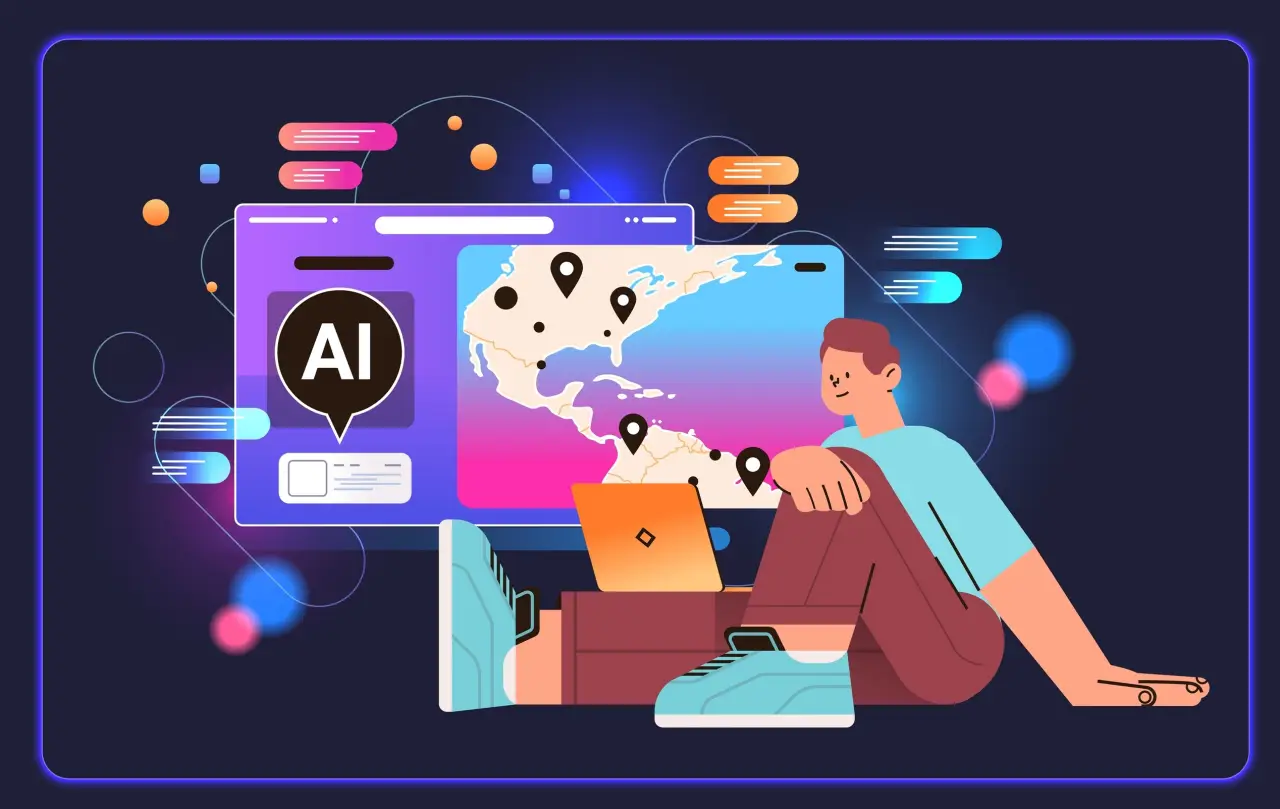AI Insights
Former SEC commissioner and AI CEO: An AI-enabled future is inspiring, but it takes planning and work

Artificial intelligence may end up being more impactful than the Industrial Revolution. The private sector already has invested vast sums into developing and deploying AI. To accelerate AI innovation and adoption in the United States, the Trump administration recently announced a sweeping “AI Action Plan.”
AI already is being used in fighting disease, doing sophisticated math, transporting people and products, supporting regulatory compliance, and designing physical structures. Last year, two Nobel Prizes had ties to AI—the Nobel Prize in physics “for foundational discoveries and inventions that enable machine learning with artificial neural networks” and the Nobel Prize in chemistry “for computational protein design” and “protein structure prediction.” In announcing the 2024 chemistry Prize, the Nobel Committee proclaimed, “Life could not exist without proteins. That we can now predict protein structures and design our own proteins confers the greatest benefit to humankind.”
An AI-enabled future is inspiring. AI’s considerable capacity to enhance a person’s daily life includes augmenting human skills, raising a person’s productivity, and performing tasks, creating opportunities for people to spend time on more pressing priorities. At a macro level, AI should spur economic growth just as other technological breakthroughs have for centuries. Even more so, imagine if AI-human collaboration identifies a cure for cancer, leads to new food sources that redress hunger, and allows the building of buildings that better withstand earthquakes, tornadoes, hurricanes, and fires—none of which is far-fetched given the pace of AI research and AI’s expanding frontier.
We appreciate that as remarkable as AI’s benefits are, AI has stirred concern for many, if not fear. Advanced AI systems are rapidly getting better at what they do. This roots some individuals’ primary worry that humans won’t be able to keep up with AI and that AI eventually will assume control. Attention also has centered on, among other things, the misuse of AI, deepfakes, hallucinations, AI’s effect on jobs, and safeguarding values that certain AI applications might affront.
Trust is paramount
How we achieve the tremendous benefits and opportunities AI offers while mitigating and managing associated risks will continue as a focus, as a matter of both policy and practice. Trust in AI is needed for AI to flourish over time, delivering gains for humanity. If guardrails and oversight are too lax, risks may turn into actual harms that we aren’t willing to accept as a society. On the other hand, AI guardrails and oversight that is too heavy-handed and restrictive may come at the expense of AI breakthroughs that spur solutions to vexing problems, lead to astounding discoveries, and raise standards of living.
With AI innovation and adoption surging ahead, the real-world value of AI is clear. A key unlock to realizing AI’s full promise will be to use AI itself to help mitigate and manage concerns with AI—something the private sector can advance.
People modulate their behavior for different situations, self-correct when held to account, and internalize virtues that inform their decisions. Advanced AI may be able to do the same, staying within defined parameters and constraints to meet society’s expectations. As AI advances, it may be possible to architect and train AI systems not only to self-identify if the system is deviating from accepted performance, but also to self-improve to comport with a society’s goals and values. Technological efforts to accomplish this are under way.
Even if realized, this type of AI alignment would not entirely address core concerns.
AI that supervises AI
Another layer needs to emerge: AI that supervises AI. People will need to collaborate with AI agents to monitor that other AI systems do what they are supposed to do. Advanced AI agents can be developed and deployed to identify if other AI agents or deployments of AI act aberrantly or nefariously, do not behave in accordance with performance benchmarks, thwart objectives they were to promote, or pose other harms. For example, with human oversight, a company’s compliance AI agents can help ensure that the AI systems the company uses in its business adhere to legal and regulatory requirements—which is impossible for humans alone to do because of the speed and scale at which a business’s advanced AI systems can operate.
The volume and extent of AI uses is enormous and expanding. This presents a difficulty. For example, when using AI to market products, provide interactive customer support, draft agreements, or create other content, businesses need to confirm that what’s generated by their AI systems is compliant. But human bandwidth, on its own, will not be enough to review and assess all the uses for compliance. This capacity gap will widen as AI advances and is adopted more widely and acts more autonomously. Companies can’t fall short of their compliance obligations; nor can they unduly hesitate, let alone pass, on using AI agents in the marketplace when their competitors are actively doing so to get a strategic and operational edge. A solution is for companies to deploy AI agents to bolster compliance, augmenting human effort and judgment. AI agents’ unprecedented ability to evaluate in seconds or minutes whether AI outputs and behaviors comply with extensive legal and regulatory requirements enables the compliant adoption and implementation of AI at scale.
AI should be embraced, even as we prepare for the change it brings. Risks need to be accounted for. But they should not dampen the commitment to fostering AI development and adoption. That commitment includes investment in basic and applied AI research. And it includes appropriately calibrating risk management and governance that builds trust without curtailing ingenuity and innovation.
Leveraging AI to help ensure that other AI systems operate beneficially and reliably—in accordance with their intended purpose—would contribute to AI’s long-term promise.
The opinions expressed in Fortune.com commentary pieces are solely the views of their authors and do not necessarily reflect the opinions and beliefs of Fortune.
AI Insights
This MOSI exhibit will give you a hands-on look at artificial intelligence – Tampa Bay Times
AI Insights
Spain Leads Europe in Adopting AI for Vacation Planning, Study Shows

Spain records higher adoption of Artificial Intelligence – AI in vacation planning than the European average, according to the 2025 Europ Assistance-Ipsos barometer.
The study finds that 20% of Spanish travelers have used AI-based tools to organize or book their holidays, compared with 16% across Europe.
The research highlights Spain as one of the leading countries in integrating digital tools into travel planning. AI applications are most commonly used for accommodation searches, destination information, and itinerary planning, indicating a shift in how tourists prepare for trips.
Growing Use of AI in Travel
According to the survey, 48% of Spanish travelers using AI rely on it for accommodation recommendations, while 47% use it for information about destinations. Another 37% turn to AI tools for help creating itineraries. The technology is also used for finding activities (33%) and booking platform recommendations (26%).
Looking ahead, the interest in AI continues to grow. The report shows that 26% of Spanish respondents plan to use AI in future travel planning, compared with 21% of Europeans overall. However, 39% of Spanish participants remain undecided about whether they will adopt such tools.
Comparison with European Trends
The survey indicates that Spanish travelers are more proactive than the European average in experimenting with AI for holidays. While adoption is not yet universal, Spain’s figures consistently exceed continental averages, underscoring the country’s readiness to embrace new technologies in tourism.
In Europe as a whole, AI is beginning to make inroads into vacation planning but at a slower pace. The 2025 Europ Assistance-Ipsos barometer suggests that cultural attitudes and awareness of technological solutions may play a role in shaping adoption levels across different countries.
Changing Travel Behaviors
The findings suggest a gradual transformation in how trips are organized. Traditional methods such as guidebooks and personal recommendations are being complemented—and in some cases replaced—by AI-driven suggestions. From streamlining searches for accommodation to tailoring activity options, digital tools are expanding their influence on the traveler experience.
While Spain shows higher-than-average adoption rates, the survey also reflects caution. A significant portion of travelers remain unsure about whether they will use AI in the future, highlighting that trust, familiarity, and data privacy considerations continue to influence behavior.
The Europ Assistance-Ipsos barometer confirms that Spain is emerging as a frontrunner in adopting AI for travel planning, reflecting both a strong appetite for digital solutions and an evolving approach to how holidays are designed and booked.
Photo Credit: ProStockStudio / Shutterstock.com
AI Insights
NBA star Tristan Thompson is bringing artificial intelligence to basketball fans

Listen and subscribe to Financial Freestyle on Apple Podcasts, Spotify, or wherever you find your favorite podcasts.
Tristan Thompson is well-recognized for his career in the NBA, having played for teams like the Cleveland Cavaliers, the Boston Celtics, and the Los Angeles Lakers, to name a few. He was even part of the team that earned an NBA championship in 2016. But while Thompson’s basketball reputation precedes him, off the court, he’s focusing on his various entrepreneurial ventures.
When asked by Yahoo Finance’s Financial Freestyle podcast host Ross Mac if he would invest his final dollar in artificial intelligence or the blockchain, Thompson picked the industry that’s already projected to be worth $3.6 trillion by 2034.
“You see what Mark Zuckerberg’s paying for all these AI gurus? So I might go AI,” he said (see the full episode above; listen below).
This embedded content is not available in your region.
Thompson has already made AI one of his entrepreneurial ventures with the launch of TracyAI, an artificial intelligence that’s meant to offer real-time NBA analysis and predictive insights.
“Imagine a sports analyst or commentator on steroids,” he explained to Mac. “What I mean by that is having all the high-level analytics that you cannot get from NBA.com and ESPN … the analytics are coming from the professional teams. We have certain data and access to certain companies that only professional sports teams have access to. And I was able to pull that data with my resources and put it into the AI agent.”
Thompson saw the venture as “low-hanging fruit,” as it was one of the few areas he hadn’t yet noticed artificial intelligence being worked into. Though AI is slowly finding its way into the sports industry, TracyAI offers basketball fans access to statistics and projections they may not have had through the typical channels, creating a unique fan experience.
Though Thompson admitted AI has created some of its own controversies, it’s a venture where he’s ready to invest some of his financial resources to capitalize on the industry’s projected rapid growth.
“For me, it’s like, if [AI is] covering so many sectors, how come it hasn’t got into sports?” Thompson said. “This is an opportunity where I can be a visionary and a pioneer … I’ve always had this grind, build-up mentality, so it just migrated easily into Web3. If you look at Daryl Morey, he said he used AI agents to curate his Sixers roster … that just shows you that’s the first domino effect into something great.”
-
Tools & Platforms3 weeks ago
Building Trust in Military AI Starts with Opening the Black Box – War on the Rocks
-

 Business2 days ago
Business2 days agoThe Guardian view on Trump and the Fed: independence is no substitute for accountability | Editorial
-

 Ethics & Policy1 month ago
Ethics & Policy1 month agoSDAIA Supports Saudi Arabia’s Leadership in Shaping Global AI Ethics, Policy, and Research – وكالة الأنباء السعودية
-

 Events & Conferences3 months ago
Events & Conferences3 months agoJourney to 1000 models: Scaling Instagram’s recommendation system
-

 Jobs & Careers2 months ago
Jobs & Careers2 months agoMumbai-based Perplexity Alternative Has 60k+ Users Without Funding
-

 Funding & Business2 months ago
Funding & Business2 months agoKayak and Expedia race to build AI travel agents that turn social posts into itineraries
-

 Education2 months ago
Education2 months agoVEX Robotics launches AI-powered classroom robotics system
-

 Podcasts & Talks2 months ago
Podcasts & Talks2 months agoHappy 4th of July! 🎆 Made with Veo 3 in Gemini
-

 Podcasts & Talks2 months ago
Podcasts & Talks2 months agoOpenAI 🤝 @teamganassi
-

 Mergers & Acquisitions2 months ago
Mergers & Acquisitions2 months agoDonald Trump suggests US government review subsidies to Elon Musk’s companies





















